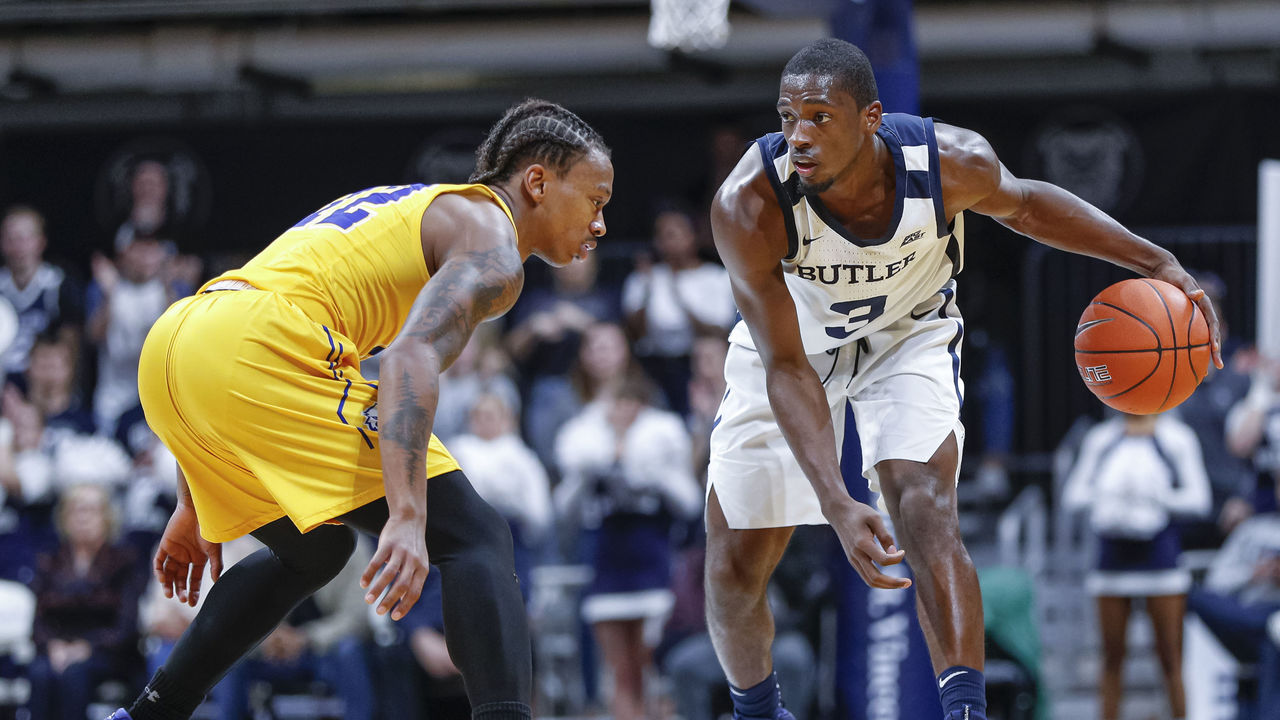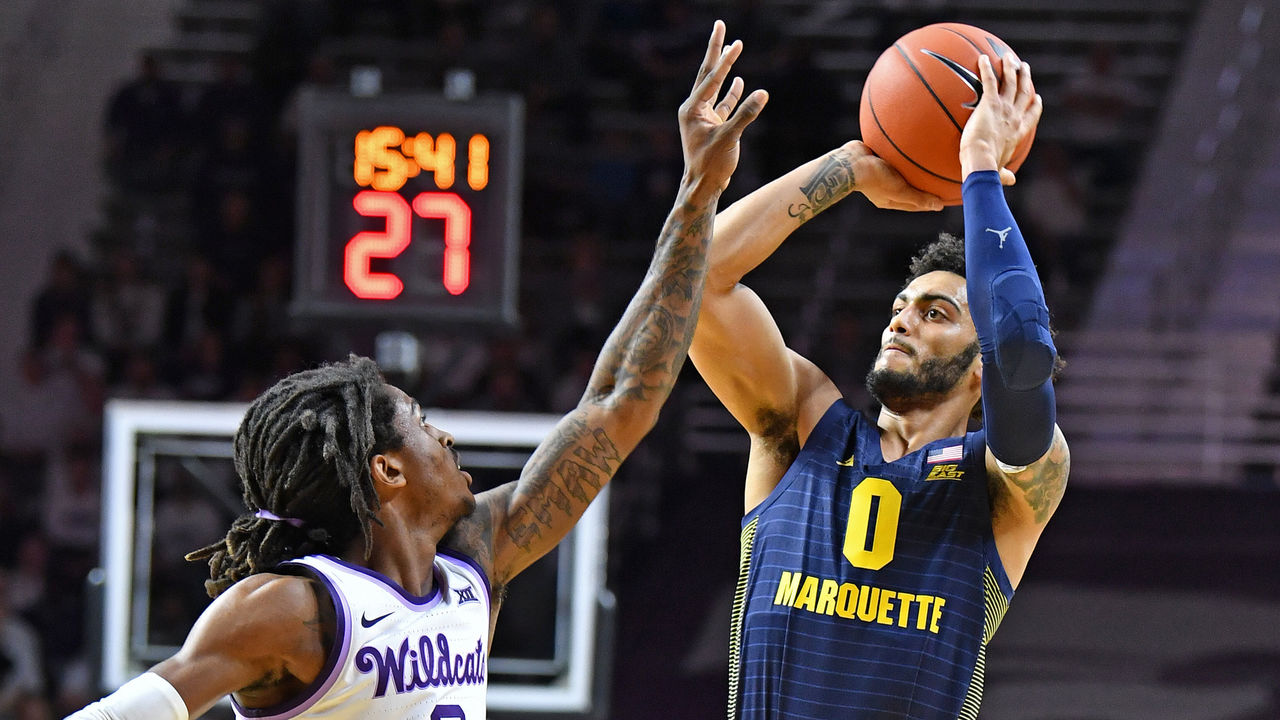Big East basketball preview: Nonconference results reshape the race
Only two teams - Villanova and Xavier - have won the Big East since its reformation in 2014. The Wildcats have won all but one of the conference titles, and Xavier finally broke through in 2018.
There's reason to believe, however, that this year could be as wide open as any. The preseason favorite to win the league (not Villanova) has struggled. The team picked to finish eighth in the preseason is surging. There won't be many - or any - easy games in conference play.
Here's your Big East preview.
| theScore's projected order of finish (last year in parentheses) |
|---|
| 1. Villanova (1) |
| 2. Butler (T8) |
| 3. Marquette (2) |
| 4. Seton Hall (T3) |
| 5. Xavier (T3) |
| 6. Georgetown (T3) |
| 7. DePaul (T8) |
| 8. Creighton (T3) |
| 9. Providence (T8) |
| 10. St. John's (7) |
5 key questions
Who can stop Villanova's offense?
In a season where many teams have struggled to adjust to the new 3-point line, Villanova just keeps making shots.
Three Wildcats - Saddiq Bey, Justin Moore, and Cole Swider - are shooting better than 40 percent from 3-point range through 10 games. Collin Gillespie (14.4 points, 5.2 assists per game) can knock down threes, too. The Wildcats are also scoring efficiently inside the arc and rank ninth in the country in effective field-goal percentage.
It's a formula that could help Villanova to its fifth Big East title in six seasons.
So far, the Wildcats have scored more than one point per possession in nine of 10 games. The only team to stop them, Ohio State, was undefeated until taking a loss at Minnesota on Sunday.
Jay Wright's squad took a slight step back last season, earning a 6-seed and checking out in the second round of the NCAA Tournament, but this team could have the offense to get deeper into March.
How has Butler's hot start changed expectations in Indianapolis?

Two months ago, Big East coaches picked Butler to finish eighth in the 10-team conference.
At the time, it made some sense. Yes, the team brought back lead guard Kamar Baldwin. But Butler finished 7-11 in conference play last season and the Bulldogs didn't generate a ton of hype in the preseason.
Fast-forward to this week: Butler has climbed to No. 10 in KenPom's ratings and is No. 4 in the first iteration of this season's NCAA NET rating (the formula that replaced the RPI a year ago).
How are the Bulldogs doing it? Baldwin (15.7 points, 4.8 rebounds per game) has been an All-Big East player. Senior Sean McDermott is making nearly half his 3-point attempts.
But the biggest change has occurred at the other end of the floor. Butler was below average defensively last season and particularly struggled to defend inside in conference play. The Bulldogs are now an above-average defensive rebounding team and have held opponents to a 26.9% mark from 3-point range. The schedule hasn't been full of cupcakes, either: Butler owns wins over Minnesota, Missouri, Stanford, Mississippi, and Florida.
Eighth? The Bulldogs are now one of two or three primary contenders for the conference title.
Can Seton Hall overcome its injuries?
The Pirates were the preseason pick to win the Big East, but nothing has gone to plan in nonconference play. Kevin Willard's team fell to 6-4 with a 68-48 loss at Rutgers on Saturday.
Making matters worse, star guard Myles Powell left in the first half with a concussion. Seton Hall was already without 6-foot-11 junior Sandro Mamukelashvili because of a fractured wrist. Mamukelashvili was arguably Seton Hall's second-most important player before his injury.
The injuries come at an inopportune time, as the Pirates have a difficult game against Maryland this week.
An inaugural member of the Big East in 1979, Seton Hall has only won the regular-season championship twice (in 1992 and 1993). This once looked like the year that could end the drought, but it's in turmoil now.
Will Markus Howard and Marquette finally get an NCAA Tournament win?

Last February, Marquette looked like it would have a top 10 team in 2019-20. Then the Golden Eagles dropped six of their final seven games to end last season, and then they lost the Hauser brothers via transfer (Sam to Virginia, Joey to Michigan State). Still, they did bring back 25-point-per-game scorer Markus Howard.
Howard (25.1 points per game) is doing his thing as the Big East's best scorer. But we still don't know who, exactly, the Golden Eagles are. Marquette has wins over Purdue, USC, Davidson, and Kansas State, but lost by double digits to Wisconsin and Maryland. Like the last few seasons, Marquette is one of the nation's best 3-point shooting teams. But it also has turnover issues at both ends of the floor. The Golden Eagles don't force many turnovers, and they give the ball up too much.
Ultimately, success for Marquette this season might come down to one thing: Can the Golden Eagles win in the NCAA Tournament? They haven't won a tournament game since Buzz Williams guided them to the Elite Eight in 2013. In two trips in five seasons under Steve Wojciechowski, they lost by 20 to South Carolina and 19 to Murray State.
It would be a shame for Howard's career to end without a taste of success in March. We'll learn more about Marquette when they host Villanova on Jan. 4.
Is DePaul for real?
Since joining the Big East in 2005, DePaul is 52-196 in conference play. The Blue Demons posted their only winning conference record in 2006-07. Two years later, they went 0-18 against Big East opponents.
DePaul hasn't made an NCAA Tournament since 2004, when Dave Leitao led the Blue Demons to the second round. Leitao left DePaul for Virginia two years later. He came back to DePaul in 2015-16, and last year, he produced the school's first winning season since 2007.
This year, the Blue Demons are 10-1 and already own wins over Texas Tech and Iowa. A loss to Buffalo likely prevented them from being ranked for the first time since November 2000, but the program still appears to have momentum. Junior guard Charlie Moore, who began his career at California and transferred to Kansas before coming to DePaul, is averaging 16.1 points and 6.7 assists per game. The Blue Demons rank second in block percentage and 10th in steal percentage (per KenPom), indicative of a defense that hasn't been fun to play against.
HEADLINES
- Dybantsa gets 30-point triple-double to lead No. 10 BYU past Eastern Washington
- No. 1 Arizona runs away from Bethune-Cookman for dominant win
- Early 2026 NBA mock draft: Boozer, Peterson, or Dybantsa at No. 1?
- No. 2 Michigan closing gap on Arizona in AP Top 25
- Wilson leads No. 12 North Carolina to rout of East Carolina